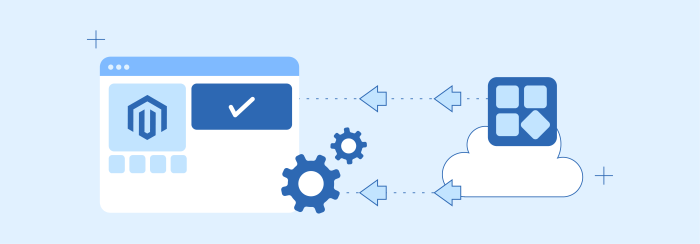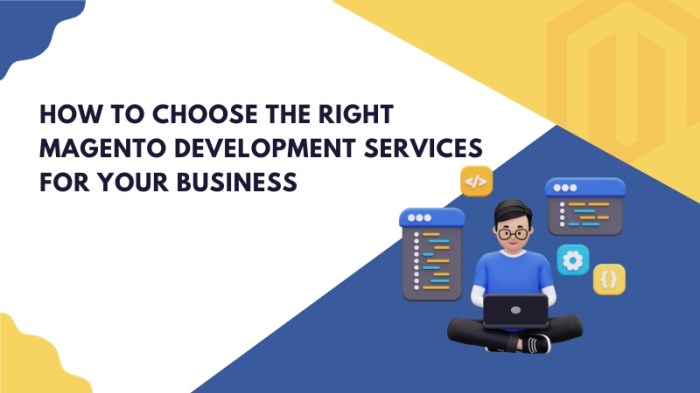Embark on a journey to discover the ins and outs of selecting the perfect Magento 2 development services for 2025. Delve into the key factors, evaluation criteria, customization capabilities, and support services that will shape your decision-making process.
Unravel the complexities of the Magento 2 development landscape as we navigate through the various aspects to consider when choosing the right services for your needs.
Factors to Consider when Choosing Magento 2 Development Services

When selecting Magento 2 development services, there are several crucial factors to keep in mind to ensure you make the right choice for your business needs.
Key Features to Look for in Magento 2 Development Services
- Customization Capabilities: Ensure the service provider can tailor solutions to meet your specific requirements.
- Scalability: Look for a developer that can accommodate your business growth and scale the platform accordingly.
- Integration Options: Check if the service provider can seamlessly integrate Magento 2 with other systems like CRM or ERP.
- Performance Optimization: Verify that the developer can optimize the platform for speed and efficiency.
Importance of Experience and Expertise in Magento 2 Development
- Experienced developers are more likely to deliver high-quality solutions and handle complex projects effectively.
- Expertise in Magento 2 ensures that the developer can leverage the platform's features to their full potential.
- Look for certifications or partnerships with Magento to validate the developer's expertise.
Comparing Pricing Models of Different Service Providers
- Consider the overall value offered by the service provider, not just the initial cost.
- Look for transparent pricing structures and avoid hidden fees that can lead to budget overruns.
- Evaluate the pricing in relation to the quality of services provided to make an informed decision.
Significance of Client Reviews and Testimonials in the Selection Process
- Client feedback provides insights into the developer's reputation, reliability, and quality of work.
- Look for testimonials that highlight successful projects and positive experiences with the service provider.
- Consider reaching out to past clients for direct feedback on their experience with the Magento 2 development services.
Evaluating Magento 2 Development Service Providers
When it comes to selecting the right Magento 2 development service provider, it is crucial to assess their credibility and reliability. This involves looking into various factors to ensure you choose a company that can meet your specific requirements and deliver high-quality results.
Checklist for Assessing Credibility
- Verify the company's experience and reputation in the industry.
- Check for client testimonials and reviews to gauge customer satisfaction.
- Ensure the company has a strong portfolio showcasing their previous projects.
- Evaluate the expertise of the team members and their certifications in Magento development.
Role of Certifications and Partnerships
- Certifications from Magento, such as Magento Certified Developer, demonstrate a company's expertise and commitment to quality.
- Partnerships with Magento as a Solution Partner or Technology Partner indicate a higher level of trust and support from the platform.
- Look for partnerships with other technology providers to ensure a comprehensive approach to development.
Verifying Portfolio and Past Projects
- Review the company's portfolio to see if they have experience in projects similar to yours.
- Ask for case studies or references to validate the success of their past projects.
- Reach out to previous clients for feedback on their experience working with the development agency.
Evaluating Scalability and Flexibility
- Assess the company's ability to scale your project according to your business growth and future needs.
- Discuss the flexibility of their development approach and how they accommodate changes and updates during the project.
- Ensure the service provider offers post-launch support and maintenance to keep your Magento store running smoothly.
Understanding Customization and Integration Capabilities
Customization and integration capabilities play a crucial role in the success of Magento 2 development services. Tailoring the platform to meet specific business requirements and seamlessly integrating with third-party applications can greatly enhance user experience and drive business growth.
Importance of Customization Options
Customization options in Magento 2 development services allow businesses to create unique and personalized online stores that align with their brand identity and meet the specific needs of their target audience. From customizing the design and layout to implementing specific functionalities, customization empowers businesses to stand out in a competitive market.
- Customizing the user interface to reflect brand identity.
- Implementing unique features and functionalities to enhance user experience.
- Integrating custom extensions to meet specific business requirements.
Examples of Successful Integrations
Successful integrations with third-party applications in Magento 2 projects can include payment gateways, shipping providers, CRM systems, and more. These integrations streamline business operations, improve efficiency, and provide a seamless experience for customers.
- Integration with PayPal for secure and convenient payment processing.
- Integration with MailChimp for targeted email marketing campaigns.
- Integration with ShipStation for efficient order fulfillment and shipping management.
Impact of Customization on User Experience and Business Growth
Customization directly influences user experience by creating a personalized and engaging online shopping environment. A well-customized Magento 2 store can increase customer satisfaction, drive repeat purchases, and ultimately lead to business growth and success.
Customization is not just about aesthetics; it's about creating a seamless and intuitive shopping experience for your customers.
Assessing Service Providers' Ability to Deliver Tailored Solutions
When choosing Magento 2 development services, it is essential to assess a service provider's ability to deliver tailored solutions. Look for providers with a proven track record of successful customizations and integrations, as well as a deep understanding of your business goals and objectives.
- Review the provider's portfolio to see examples of past customization projects.
- Inquire about their experience with integrating third-party applications and systems.
- Discuss your specific requirements and evaluate how the provider proposes to address them.
Support and Maintenance Services for Magento 2 Development
When it comes to Magento 2 development, support and maintenance services are crucial for ensuring the smooth functioning of your e-commerce website. These services help in resolving issues, implementing updates, and ensuring that your website remains secure and up-to-date.
Types of Support and Maintenance Services
- 24/7 Technical Support: Round-the-clock assistance for any technical issues that may arise.
- Regular Updates and Patches: Ensuring that your Magento 2 website is always running on the latest version for security and performance improvements.
- Performance Monitoring: Monitoring the performance of your website to identify and address any bottlenecks or issues.
- Backup and Recovery: Regular backups of your website data to prevent data loss in case of any unforeseen events.
Best Practices for Continuous Support and Timely Updates
- Establish a clear communication channel with your Magento 2 development team for quick issue resolution.
- Schedule regular maintenance checks to identify and address any potential issues proactively.
- Create a detailed roadmap for updates and enhancements to keep your website up-to-date and competitive.
- Invest in ongoing training for your team to ensure they can effectively manage and update your Magento 2 website.
Significance of Service Level Agreements (SLAs)
- SLAs define the level of service and support that you can expect from your Magento 2 development company.
- They Artikel response times, issue resolution procedures, and other important details to ensure a smooth support process.
- Having SLAs in place helps in setting clear expectations and holding the development team accountable for their performance.
Effective Support Strategies for Magento 2 Websites
- Implement proactive monitoring tools to identify and address issues before they impact the user experience.
- Regularly audit and optimize your website for performance and security to ensure a seamless shopping experience for customers.
- Offer ongoing training and support to your team to empower them to manage and update the website effectively.
- Engage with the Magento community for best practices, tips, and tricks to enhance the functionality and performance of your website.
Conclusive Thoughts

In conclusion, navigating the realm of Magento 2 development services in 2025 requires a keen eye for detail and a strategic approach. By leveraging the insights shared in this guide, you can confidently steer towards the optimal choice for your business growth and online success.
FAQs
What are the key features to look for in Magento 2 development services?
Key features include robust security measures, advanced customization options, seamless integration capabilities, and scalable architecture.
How important are client reviews and testimonials in the selection process?
Client reviews and testimonials play a crucial role in gauging the credibility and quality of Magento 2 development services, providing valuable insights into past experiences.
What types of support and maintenance services are typically offered by Magento 2 development companies?
Common support services include bug fixes, security updates, performance optimization, and technical assistance for ongoing maintenance.
How can I assess a service provider's ability to deliver tailored solutions?
You can assess this by reviewing their portfolio, discussing customization options, and understanding their process for addressing unique business needs.

















